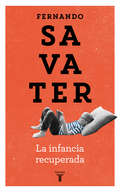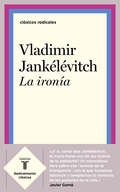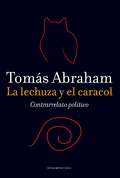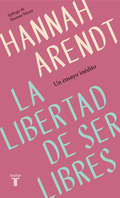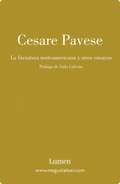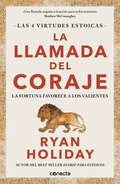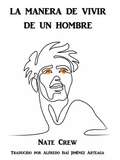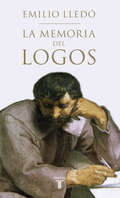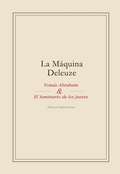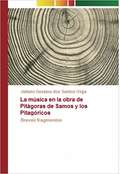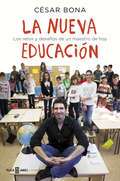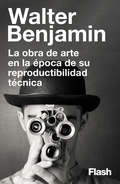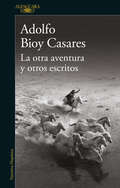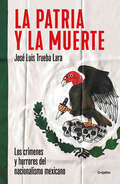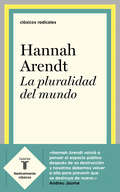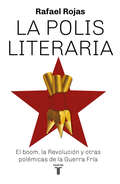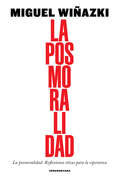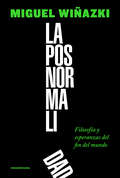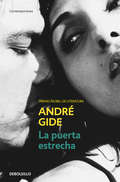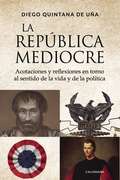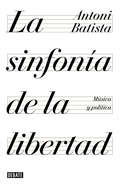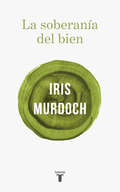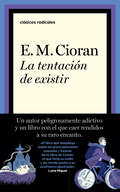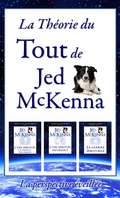- Table View
- List View
La infancia recuperada
by Fernando Savater«Este es un libro sobre libros: un libro sobre el amor a los libros y sobre la fuerza absorta de leer.»Fernando Savater La infancia recuperada es un conjuro literario para evocar la huella gozosa dejada en la memoria del escritor por los relatos que animaron su adolescencia y primera juventud. Un proyecto que Fernando Savater continuaría desarrollando más adelante en Criaturas del aire. Porque las hermosas historias inventadas por Robert L. Stevenson, Julio Verne, Zane Grey, Jack London, H.G. Wells, Karl May y Conan Doyle, las heroicas hazañas de Sandokan o las divertidas aventuras de Guillermo Brown forman parte de un universo mítico situado por encima de las modas y de las edades. En el prólogo que escribiera en su día para la edición de bolsillo (aparecida diez años después de su publicación original), Fernando Savater explica los motivos que le impulsaron a escribir esta obra «sobre el amor a los libros y sobre la fuerza absorta de leer» y aclara algunos malentendidos en torno a sus propósitos. «Es descabellado suponer que mientras haya gente afectada por esta maldición del ansia insaciable de cuentos, incapaces de considerar la sabiduría o el amor fuera del prisma de lo narrativo, inútiles para otra perspectiva de la acción que no sea el punto de vista del héroe, es descabellado suponer que mientras haya enfermos incurables del mito, como lo soy yo, las historias perdurarán aunque se hunda la literatura y la cultura toda que conocemos?»Fernando Savater
La ironía
by Vladimir JankélévitchNo existe humor sin amor ni ironía sin alegría. No hay nada más radical que un clásico. ¿Qué es la ironía? ¿Qué formas adopta y qué trampas contiene? ¿Acaso puede llegar a definirse frente a la hipocresía como una verdadera conciencia alegre? No existe humor sin amor ni ironía sin alegría. La ironía salva lo que puede ser salvado. Porque gracias a la ironía, el pensamiento actúa más ágilmente cuando se la reconoce en el espejo de la reflexión.
La lechuza y el caracol: Contrarrelato político
by Tomás AbrahamEn palabras del autor, «el kirchnerismo no solo gobierna por la recuperación económica sino por una cuestión de fe, en esto se diferencia del menemismo». Abraham discute con lucidez y valentía este sistema de creencias. Se usa la memoria colectiva para legitimar el poder. La nación argentina se convierte en un monstruo dormido que sueña la voluntad de los que mandan. Segrega palabras que le dan una identidad. Las necesita para no perderse, para sentirse dueña de un destino, depositaria de alguna misión. Un filósofo se dedica a «desrelatar», a «contraopinar», a no creer en lo que él mismo piensa, sostiene en estas páginas Tomás Abraham. La conversión de un pensamiento en una creencia es igual a un procedimiento de momificación. Pensar es como respirar, la falta de aire lo acaba, lo esteriliza, lo aplasta. Y los voceros del saber y del poder instituyente no sólo quieren que creamos, sino que lleguemos a la cumbre de la creencia: la adoración. La sociedad argentina dicen que volvió a creer. Sacrificio. Víctima. Mártir. Enemigo. Hereje. Mito. Estas son las palabras y las imágenes en las que se basa el relato. Abraham discute con lucidez y valentía este sistema de creencias. Por eso, los fragmentos reunidos en este libro se organizan como un contrarrelato: no son su negativo, sino la palabra de lo que aquel relato silencia y los actos que preanuncia.
La libertad de ser libres
by Hannah Arendt«Leer a Hannah Arendt permite comprender mejor el presente.» Berliner Morgenpost ¿Qué es la libertad y qué significa para nosotros? ¿Consiste solo en la ausencia de miedo y restricciones, o acaso implica también la participación en procesos sociales, con voz política propia, ser escuchado, reconocido y finalmente recordado por otros? Publicado en Estados Unidos en los años sesenta pero inédito hasta hoy en español -y en alemán-, este ensayo refleja el rigor y la fuerza del pensamiento político de Hannah Arendt y condensa con precisión y maestría sus reflexiones sobre la libertad, de gran calado y capaces de conectar de manera asombrosa con los desafíos y peligros de nuestro tiempo. Arendt rastrea el desarrollo histórico de la noción de libertad, en particular, toma en cuenta las revoluciones en Francia y América. Mientras que la primera supuso un punto de inflexión en la historia pero terminó en desastre, la otra fue un éxito triunfal pero se mantuvo como un asunto local. Repensar la idea de revolución se ha vuelto imperioso hoy, y este reencuentro con Hannah Arendt representa el impulso necesario para las nuevas generaciones. La crítica ha dicho:«Este ensayo recién redescubierto es como una petición de compromiso político en la era de Trump.»Die Zeit «Pese a haber sido escrito hace cincuenta años, es tan moderno que parece pensado para la actualidad política mundial.»Westdeutscher Rundfunk «Breve y revelador. Escrito hace más de cincuenta años, es de una vigencia pasmosa.»Deutschlandfunk Kultur «Una pieza muy atractiva y perdida por largo tiempo.»Süddeutsche Zeitung «Este texto tiene futuro hoy.»Frankfurter Rundschau «Un texto muy sugerente, que además es perfecto para los recién llegados a Arendt.»Zeitzeichen «Un ensayo inspirador de una relevancia extraordinaria, especialmente en tiempos en que se cuestionan los valores liberales del orden democrático.»Philosophie «Lo que parece un análisis preciso de la fallida construcción de la nación por medios militares, desde Somalia hasta Irak y Afganistán, en realidad tiene cinco décadas de antigüedad.»Westdeutsche Allgemeine Zeitung «Vale la pena leerlo por la claridad de su razonamiento, por ejemplo a la hora de fijar el concepto de "revolución" y reflejar su cambio histórico de significado.»Badische Neueste Nachrichten
La literatura norteamericana y otros ensayos
by Cesare PaveseCesare Pavese escribió estas palabras con solo diecinueve años, pero a lo largo de su vida no hizo más que confirmar esa pasión por la literatura. Su figura, contradictoria a veces y atormentada siempre, destaca con fuerza hoy, a los cien años de su nacimiento, aportando un rigor y una profundidad inusuales en estos tiempos.Los ensayos que componen el volumen, tanto si se ocupan de Faulkner y Dickens, como del concepto del intelectual políticamente comprometido o de las raíces del mito poético, brillan por su hondura y su lenguaje conciso y chispeante a la vez, descubriéndonos la faceta quizá menos conocida de uno de los maestros de la literatura europea contemporánea.
La llamada del coraje: La fortuna favorece a los valientes (Las 4 virtudes estoicas #Volumen 1)
by Ryan HolidayLa llamada del coraje nos llega a cada uno de nosotros una vez en la vida. Si no respondes tú, ¿quién lo hará? Si no es ahora, ¿cuándo? Ryan Holiday, autor superventas y referente del estoicismo moderno, defiende el coraje como la virtud fundamental para vencer el miedo. Nada es posible sin la virtud del coraje. Desde los antiguos espartanos hasta el Movimiento por los derechos civiles; desde científicos pioneros hasta empresarios innovadores; desde Charles de Gaulle hasta Florence Nightingale, los grandes líderes han pasado a la historia por los riesgos que se atrevieron a asumir. Sin embargo, hoy somos muchos los que nos vemos paralizados por el miedo. En este primer libro de una nueva serie sobre las virtudes cardinales del estoicismo, Ryan Holiday nos enseña por qué el coraje es tan importante y cómo cultivarlo en la vida diaria. A partir de las acciones de quienes han respondido a la llamada del destino, Holiday nos muestra cómo podemos dar un paso adelante incluso cuando los demás dan un paso atrás. Porque tener coraje es mucho más que lanzarse al combate. Tener coraje es hacer lo correcto, enfrentarse a las convenciones y defender las propias creencias; es creatividad, generosidad y perseverancia. Y es la única forma de vivir una vida plena, extraordinaria y efectiva. Todo en la vida empieza con el coraje. Y este libro te dotará de la valentía necesaria para dar el primer paso, para responder a la llamada. Reseñas:«La llamada del coraje de Ryan Holiday traza la historia del coraje y sus muchas facetas a lo largo de los años y llega al presente con una llamada urgente a la acción para cada uno de nosotros. Cuando nos enfrentemos a nuestros enemigos, tanto internos como externos, ¿acudiremos a la llamada del coraje o agacharemos la cabeza ante los susurros de la cobardía? La respuesta a esta pregunta va más allá del sentido del deber; es nuestra libertad la que está en juego. Va más allá de ganar o perder; es nuestra supervivencia la que está en juego. Depende de mí, depende de ti, depende de todos nosotros. Aceptemos el reto».Matthew McConaughey, actor ganador de un Oscar y autor bestseller de The New York Times «En un mundo repleto de personas mortificadas por el miedo y temerosas de dar la cara, nuestra salvación depende de cultivar el coraje en todas las áreas de la vida. Este libro de Ryan Holiday es una clara e inspiradora guía sobre cómo desarrollar esta importante virtud humana».Robert Greene, autor del bestseller Las 48 leyes del poder «Ryan Holiday muestra su propio coraje en este libro al no seguir la norma, al enfrentarse al poder con la verdad y al demostrarnos por qué no debemos ceder ante el miedo si queremos avanzar juntos con gracia y humanidad. Recopilando ejemplos de la historia –desde el mundo de la Grecia y la Roma antiguas a Florence Nightingale, hasta su propia crítica del «coraje vacío» de nuestro tiempo– Holiday explica por qué la virtud importa ahora más que nunca».Nancy Sherman, profesora de Filosofía en la Universidad de Georgetown. «En esta llamada a actuar de acuerdo con tus convicciones, Holiday se basa en un notable repertorio de personalidades, desde Sócrates hasta Solzhenitsyn. Un libro sincero y apasionante».Shadi Bartch, profesor de Filología Clásica en la Universidad de Chicago.
La manera de vivir de un hombre
by Nate CrewEsta guía es un código contundente de un individualista. No es una nueva filosofía, sino una guía sencilla y práctica hacia la manera más benéfica de pensar y actuar para un hombre. Nueve reglas de oro que resumen los principios básicos de ética, autodeterminación, y cómo sacar el mayor provecho de tu vida. Originalmente fue escrita para los hijos del autor, pero su solidez y validez la hacen un recurso valioso para cualquiera que necesite valores racionales en su vida.
La memoria del Logos
by Emilio LledóPREMIO PRINCESA DE ASTURIAS DE COMUNICACIÓN Y HUMANIDADES 2015 PREMIO NACIONAL DE LAS LETRAS ESPAÑOLAS 2014 La memoria del logos es uno de los textos clave de Emilio Lledó, gran exponente de la filosofía contemporánea Dialogar con el creador de los diálogos es uno de los ejercicios más fecundos para volver a plantear las cuestiones esenciales de la filosofía. En las largas listas de investigaciones sobre Platón se ha olvidado frecuentemente que entre su orilla y la nuestra fluyen las mismas preguntas. ¿Cómo vivir? ¿Para qué pensar? ¿Cómo relacionar la idea y la realidad? ¿Qué es sentir? ¿Qué es amor? ¿Cómo puede el lenguaje comunicar eso que se llama «verdad»? ¿Por qué el lenguaje puede ir más allá que la simple referencia a lo real? ¿Tiene la teoría alguna otra justificación que aquella que le da la praxis? ¿Son los conceptos, las palabras, reflejo fiel de la vida y del conocimiento, o son su deformación? ¿Puede la educación, la paideia, mejorar a los hombres? ¿Tiene sentido la palabra felicidad? Un nuevo Platón emerge de las cuestiones que laten en este libro. Emilio Lledó es un filósofo capaz de otorgar a la filosofía una dimensión práctica y de construir puentes entre los filósofos clásicos y nosotros. Su vocación docente consigue que sus libros estén al alcance de cualquier lector interesado en la filosofía, el lenguaje y la moral. «Pensador de relevancia internacional y de trayectoria ejemplar en el ámbito de las humanidades, concibe la Filosofía como meditación sobre el lenguaje y subraya la tendencia natural del ser humano hacia la comunicación. [...] Hace suya la razón ilustrada a través de un diálogo que impulsa la convivencia en libertad y democracia.» Del acta del Jurado del premio Princesa de Asturias «Por su pensamiento y dilatada obra, que armoniza la filosofía del Logos, la hermenéutica, el valor estético y ético de la palabra, la defensa de la libertad y reivindica la vocación docente.» Declaración del jurado que le otorgó el Premio Nacional de las Letras Españolas 2014 La crítica opina... «Un gran ensayista y divulgador de alto nivel, entre los temas que trata destacan la defensa de la lectura, la felicidad, el silencio, la belleza y la verdad.» Winston Manrique, El País
La máquina Deleuze: Tomás Abraham y el seminario de los jueves
by Tomás AbrahamEl Seminario de los Jueves de Tomás Abraham era el equipo perfecto capaz de concentrar todas las heterogeneidades del pensamiento de Deleuze para conseguir esta máquina que funciona de muy diversas maneras. Deleuze irrumpe en el pensamiento del siglo XX como una tempestad. Impone a su paso nuevas posiciones, nuevas actitudes, nuevas palabras, nuevas condiciones de lectura. Este libro es literalmente una máquina que transporta en todas las direcciones que Deleuze inspira las formas menos previsibles del pensamiento filosófico y también sus proyecciones sobre el suelo de la literatura, ya sea específicamente técnicas o biográficas. Como dice Tomás Abraham en el prólogo, hay un Deleuze edificante, un Deleuze sísmico y, a partir de éstos, hay contemplaciones de lucidez extraordinaria y aludes que aglutinan cadenas de pensamiento.
La música en la obra de Pitágoras de Samos y los Pitagóricos: Breves fragmentos
by Juliano Gustavo dos Santos OzgaEl tema de este libro, de acuerdo con el título es la música (del griego μουσική τέχνη – musiké téchne, esto es, “El arte de las musas”) en la obra de Pitágoras, primer pensador de la historia de la filosofía, haciendo de ese arte el centro de su visión del mundo, mediante su inclusión en las llamadas “ciencias exactas”. Para que haya mayor claridad y comprensión al respecto del pensamiento de Pitágoras, cuyos escritos han llegado hasta el siglo XXI extremadamente fragmentados y en un número muy reducido, se hace necesaria la investigación de fuentes históricas contemporáneas al filósofo, así como de aquellos que le sucederán.
La nueva educación: Los retos y desafíos de un maestro de hoy
by César Bona¿Por qué ya no son tan importantes los libros de texto? ¿Por qué hay que relativizar la importancia de los deberes? ¿Por qué se debe educar en empatía? ¿Por qué la educación debe estar por encima de todos los gobiernos? La nueva educación es el testimonio sincero y valioso de un maestro de hoy. «Cada niño es un universo. Todos los niños son extraordinarios y no basta con llenarles la cabeza de datos, sino que hay que facilitarles herramientas como conocimiento, empatía, sensibilidad y resiliencia para que puedan salir fortalecidos de las situaciones adversas. Deben saber que si se proponen algo y luchan por ello, pueden conseguirlo, y que de ellos depende que el mundo sea un lugar mejor.»César Bona César Bona, uno de los cincuenta mejores maestros del mundo según el Global Teacher Prize, el llamado Premio Nobel de los profesores, nos aclara en este libro que ser maestro no es acomodar a los alumnos a unos planes de estudio: todo educador debe adaptarse al motor imparable y entusiasmado de un niño. Hay que motivarles, estimular su creatividad y aguijonear su curiosidad; porque los niños no son solo los adultos del mañana: son habitantes del presente. En primera persona, César Bona relata anécdotas, nos cuenta los momentos clave en su vida que le convirtieron en el maestro que es en la actualidad, y nos muestra que la metodología de enseñanza más efectiva es implicarse con los alumnos. Porque el educador es un ser privilegiado, que puede impartir y compartir sus conocimientos en tribu. Porque otra educación es posible. La crítica ha dicho...«César está abriendo nuevos horizontes para los niños. Está creando líderes del futuro, animándoles a tomar las riendas para emprender acciones y cambiar actitudes -y prácticas- en sus sociedades.»Jane Goodall «Enseña a sus alumnos a disfrutar de la naturaleza y de los animales, hacer películas, jugar, imaginar y pensar en los demás. También les enseña inglés, historia y matemáticas, pero lo más importante para él es que sean buenas personas.»Nativel Preciado, Tiempo
La obra de arte en la época de su reproductibilidad técnica
by Walter BenjaminUno de los ensayos vertebradores de la teoría artísticadel mundo contemporáneo. Para Walter Benjamin, la pieza original de cualquier elemento de la realidad, incluyendo la obra de arte, reside en el concepto del aura. El aura como aquello irrepetible que confiere misterio y exclusividad al objeto. En este magnífico ensayo, el filósofo alemán, fundamental para el pensamiento del siglo XX, analiza, ya adelantado a su tiempo, el devenir del arte en un mundo contemporáneo, donde la idea de unicidad se escapa. Si la obra artística puede ser reproducida, y con ello modificada, el misterio que engloba su propia creación se revela. ¿Dónde quedan en este proceso su ritualidad y su significado? ¿La homogeneidad del arte implica su democratización? «Benjamin explicó la modernidad con una autoridad que ni cincuenta años de cambios imprevisibles ha debilitado». The New York Review of Books
La otra aventura y otros escritos
by Adolfo Bioy CasaresLa otra aventura y otros escritos reúne cinco obras de no ficción que escribió Bioy Casares en diferentes años entre 1968 y 1999. Inaugura este volumen de no ficción La otra aventura (1968), una serie de prólogos y artículos de Bioy entre los que se destacan un análisis en torno a la originalidad de La Celestina y una valiosa nota sobre su amistad con Borges; en Memoria sobre la pampa y los gauchos (1970) Bioy explora las múltiples resonancias de esas palabras que a él le despiertan ansiedad pero «para la mayoría de los argentinos son de uso turístico»; el hilarante y satírico Diccionario del argentino exquisito (1971) incluye verdaderos hallazgos; Unos días en el Brasil (1991), el diario de un viaje realizado en 1960 en el contexto de un congreso del PEN Club, y De las cosas maravillosas (1999), reflexión luminosa que tiene como objetivo ayudar a conocernos mejor.
La patria y la muerte: Los crímenes y horrores del nacionalismo mexicano
by José Luis Trueba LaraTras la brutalidad de la Revolución, los sobrevivientes necesitaban una esperanza y el nacionalismo se la dio. Pero a un costo altísimo: muerte y mentira. El discurso oficial asienta que el amor a México es obligatorio, eterno, inamovible y perfecto. No es así. El actual nacionalismo mexicano es una invención posrevolucionaria, fomentado para crear un sentido de unidad y de propósito tras la matanza vivida entre 1910 y 1917. Y eso es lo de menos. Ese patriotismo fue una excusa para perpetrar algunas de las peores atrocidades que se han cometido en suelo patrio. Discriminación, racismo, clasismo y exclusión son sus caras menos oscuras. Las peores se llaman odio, expulsión, destierro, asesinato y genocidio. Esta obra señala el negro camino que ha seguido la devoción hacia México y la impunidad de la que ha gozado. Hoy, como nunca, se vuelve necesario reflexionar sobre el tema de esta obra: ¿a qué deliriosnos puede llevar el nacionalismo desatado?
La pluralidad del mundo
by Hannah ArendtLa obra de Hannah Arendt sintetizada en esta antología esencial e imprescindible. No hay nada más radical que un clásico. Hannah Arendt, la gran pensadora del siglo XX, es sin duda fundamental para afrontar los desafíos del XXI. Abordó todas las cuestiones clave de su tiempo, desde el antisemitismo hasta el totalitarismo, los orígenes de la democracia, la crisis de la autoridad, los fundamentos de la educación y la estética o el problema del mal en la modernidad. Toda su obra está sintetizada en esta antología esencial e imprescindible. ------------- radical: adj. Perteneciente o relativo a la raíz. «Clásicos Radicales» nace con la misión de recuperar algunos de los libros más emblemáticos del sello que en su día formularon una idea nueva u ofrecieron una mirada original y pertinente sobre las grandes cuestiones universales.Ausentes de las librerías durante demasiado tiempo pero recordados y buscados por los lectores más despiertos, estos textos esenciales de disciplinas como la filosofía, la ética, la historia, la sociología, la economía, la antropología, la psicología y la política mantienen su plena vigencia y vuelven hoy con fuerza para iluminar nuestro presente. ------------- Reseña:«Hannah Arendt volvió a pensar el espacio público después de su destrucción y nosotros debemos volver a ella para prevenir que se destruya de nuevo.»Andreu Jaume
La polis literaria: El boom, la Revolución y otras polémicas de la Guerra Fría
by Rafael RojasAmérica Latina vivió intensamente la Guerra Fría en la política, pero también en la cultura. La Revolución cubana jugó un papel central en aquel conflicto, en buena medida, por haber sido un movimiento político que en el lapso de una década recorrió casi todas las facetas de la izquierda regional. La polis literaria nos muestra ese camino y pone voz a todos los intelectuales de aquella época. La querella ideológica de la Guerra Fría, en los años sesenta y setenta, reformuló el gran tema cultural de las identidades nacionales y el latinoamericanismo, que se discutía desde la guerra de 1898 en el Caribe, y la nueva novela fue sometida a indagaciones críticas encontradas a partir de diversas ideologías de izquierda. Ése fue el contexto de la entrada en escena del llamado boom de la nueva novela latinoamericana. Una generación de escritores nacida, fundamentalmente, entre los años veinte y treinta, como Julio Cortázar, Augusto Roa Bastos, Gabriel García Márquez, Carlos Fuentes, José Donoso o Guillermo Cabrera Infante, comenzó a publicar cuentos y novelas en los años previos al triunfo de la Revolución cubana, en enero de 1959. El oficio de la literatura, o específicamente de la novela, al que aspiraban aquellos escritores, formó parte del conflicto ideológico de la Guerra Fría. La literatura latinoamericana no podía imaginarse al margen de la oposición a las dictaduras y de la lucha de la izquierda por el socialismo o la democracia. Con una nueva mirada a los escritores del boom, Rafael Rojas nos muestra las poéticas y luchas intelectuales y sociales de esa literatura que transformó y dio una vuelta de tuerca a lo llamado latinoamericano.
La posmoralidad: Reflexiones éticas para la esperanza
by Miguel WiñazkiMiguel Wiñazki recorre valientemente los temas más difíciles que enfrenta la sociedad argentina. Desde por qué legitimamos el escrache o un corte de calle hasta por qué triunfan líderes fascistas y cómo fue que el barrabravismo sustituyó la política. El nuevo libro de Miguel Wiñazki es una invitación a salir de la vorágine y pensar algunos de los dilemas éticos que afectan más profundamente a la sociedad argentina. ¿Cuál es el origen simbólico del escrache? ¿De dónde proviene la idea de que cortar una calle es legítimo? ¿Cómo se construyen la adhesión y la congregación por parte de líderes fascistas y populistas? ¿Qué hay detrás de la devoción a un psicópata? ¿Cómo se diseña la arquitectura del fanatismo, de una tribuna cautiva? ¿De qué manera el barrabravismo sustituyó a la política? ¿Por qué permitimos la distorsión de la verdad? ¿Cómo puede ser que hombres y mujeres que representan la lucha por los derechos humanos en nuestro país defiendan gobiernos autoritarios -como el de Maduro en Venezuela- o justifiquen ataques terroristas? ¿Por qué nos cuesta tanto hablar con la verdad acerca del número de desaparecidos que dejó la dictadura militar? Reina la posmoralidad, la indiferencia en torno a la ética. Sin embargo, no todo es oscuridad. La censura ha muerto: la multiplicidad de redes sociales barrió con cualquier obstrucción informativa. Pero también muchas personas son capaces de morir por una selfie. En tiempos como estos, Wiñazki promueve una ética para la esperanza a través de inspiradoras y breves reflexiones. Porque, como dice en este libro, podemos tener en nosotros mismos todos los sueños del mundo.
La posnormalidad: Filosofía y esperanzas del fin del mundo
by Miguel WiñazkiMiguel Wiñazki recobra temas fundamentales explorados por filósofos, escritores y artistas y los pone bajo la óptica de nuestra nueva vida cotidiana: la soledad, el encierro creativo, la locura, la angustia existencial, la libertad, el amor, la amistad y la esperanza, entre otros. "Una marea atravesó nuestra vida -dice el autor- pero no apagó nuestros deseos de pensar: los refundó. Frente al paisaje de la enfermedad y de la muerte, todos filosofamos. Retroviral, la filosofía ha resucitado de sus cenizas portando el farol de Diógenes, encendido necesariamente porque así lo requiere la oscuridad." Miguel Wiñazki recobra en este libro temas fundamentales explorados por filósofos, escritores y artistas y los pone bajo la óptica de este raro presente: la soledad, el encierro creativo, la angustia existencial, la libertad, el amor y la esperanza, entre otros. De Sócrates a Fellini, de Boccaccio a Ana Frank, del anticristo al efecto mariposa, de la amistad en Aristóteles a la amistad en Borges, La posnormalidad nos sumerge en aguas profundas, con lucidez y un discreto optimismo, para desentrañar el mensaje secreto que encubre nuestra nueva vida cotidiana. "Lo extraordinario de la profundidad es que es insondable porque es puro abismo. Pero quien se abisma se eleva."
La puerta estrecha
by André GideNarrada en forma de confesión íntima, este libro bellísimo denuncia los extravíos de una moral austera y puritana, capaz de negar las leyes de la naturaleza y de la vida. Jérôme Palissier es un delicado joven parisino que pasa los veranos en la casa de campo de su tío, en Normandía. Durante uno de esos veranos él y su prima Alissa se enamoran profundamente. Sin embargo, ella se convence poco a poco de que la apasionada alma de su amado corre peligro; para salvarlo, decide recorrer el camino de la renuncia y el ascetismo espiritual. Reseña:«Gide, a quien he podido admirar por vez primera en este libro, es dueño inusitado del mundo que describe. En él todo sirve a un propósito, y de esa firmeza nacen las finas ramificaciones que, como la savia, alimentan al libro apaciblemente, hasta sus márgenes inconmensurables.»Rainer Maria Rilke
La república mediocre
by Diego Quintana de UñaUn nuevo enfoque de la Teoría Política, a la luz de la física y de la conciencia, para incitar al lector a dudar y a repensar la Política desde una nueva perspectiva. No se puede comprender el sentido de la ética y de la política sin entender el sentido de la vida. <P><P>La República Mediocre es un ambicioso intento para integrar estos extremos, en el que se repasan con nuevas luces todos los grandes temas de la Teoría Política, desde los principios, como la Libertad y la Justicia, hasta los regímenes políticos, como las democracias o los sistemas autoritarios, pasando por las ideologías y las utopías, pero hilvanando todos estas materias con el sutil hilo de la conciencia, cuya luz nos permite unificar y comprender en profundidad el sentido de la vida individual y de la vida colectiva. <P>La obra se cierra con un inquietante epílogo, titulado «Metarrelatos de la servidumbre», en el que se resumen toda suerte de conspiraciones, desde las humanas hasta las «divinas» pasando por la de «los dioses astronautas», todo con el único fin de incitar al lector a la duda y a una reflexión profunda sobre todos estos grandes temas.
La sinfonía de la libertad: Música y política
by Antoni Batista<P>Esta obra ofrece una gran panorámica de la música política de todos los tiempos, compositores e intérpretes. Si eres amante de la música, disfrutarás con esta faceta de Antoni Batista en un viaje inédito por el arte de los sonidos. <P>Mozart hizo política. Beethoven es el legado de la Revolución Francesa a la Unión Europea. Chopin, Verdi, Sibelius, Falla reivindicaron patrias libres. Dvorak inventó el federalismo sinfónico. La inmensa creatividad de Shostakóvich venció al estalinismo. Casals desafió a Franco y a Hitler. Celibidache se rebeló contra la industria discográfica. Barenboim unió a palestinos y a judíos... <P>La música y la política se han ido entrelazando a lo largo de la historia, pero es una relación poco menos que desconocida. La sinfonía de la libertad recoge sus encuentros más significativos. Además de abundante información, que sorprenderá a muchos, este libro contiene aportaciones musicológicas originales de un autor que logra aunar el desafío intelectual del ensayo con el ritmo trepidante de la narrativa.
La sirena viuda
by Mario BenedettiEn esta antología, el mismo Benedetti ha seleccionado sus mejores cuentos de los libros Montevideanos (1962), La muerte y otras sorpresas (1968), Con y sin nostalgia (1977), Geografías (1984) y Despistes y franquezas (1989). El amor en todas sus formas, la vida, la muerte y el exilio se dan cita en estos relatos que nos brindan la oportunidad del reencuentro con páginas queridas o el placer del descubrimiento.
La soberanía del bien
by Iris MurdochLa gran aportación filosófica de Iris Murdoch en el centenario de su nacimiento. Antes de convertirse en la gran novelista que fue, Iris Murdoch se dedicó intensamente a la filosofía, enfrentándose con valentía a los círculos analíticos y existencialistas de la época y buscando un camino de salida en el páramo de la posguerra europea. Especialista en Platón, relacionada con la escuela de Wittgenstein, pero siempre radicalmente independiente, Murdoch reunió en La soberanía del bien (1970) tres conferencias que resumen lo que había sido su investigación filosófica desde la década de 1950. A diferencia de la mayoría de sus colegas en Oxford y Cambridge, Murdoch estaba interesada sobre todo en la vida moral y en las posibilidades reales que el ser humano tiene de hacerse mejor persona. La idea del Bien en un mundo sin Dios fue siempre su principal preocupación y a ella le dedica estos tres ensayos combativos y edificantes. En esta edición, Andreu Jaume nos ofrece una nueva traducción anotada de este clásico del pensamiento así como un largo ensayo introductorio en el que se estudia la vida, la filosofía y las novelas de quien fue definida en su tiempo como «la mujer más brillante de Inglaterra». La crítica ha dicho:«Uno de los escasos libros modernos de filosofía que personas ajenas a la filosofía académica pueden encontrar realmente útil.»Mary Midgely «Excelente. Golpea en la raíz misma de nuestra autocomprensión contemporánea. Niega cosas que tendemos a entender como evidentes. Por esa sola razón ya vale la pena leer este breve libro.»The Guardian
La tentación de existir
by E.M. CioranEl perfecto Clásico Radical: un autor peligrosamente adictivo y un libro (inencontrable durante años) con el que caer rendidos a su raro encanto. En este libro clave de Cioran, los lectores se reencontrarán con su voz irónica, serena y al tiempo desesperada. El autor se enfrenta con lucidez al pragmatismo acrítico, y escribe con mirada perpleja sobre Occidente, el destino histórico de pueblos «extremos» como España o Rusia, el significado del exilio para el escritor, la tarea de crear, la soledad, la locura y la muerte. Aunque a primera vistael nihilismo de Cioran parece severo y hastiado, su energía y sus contradicciones resultan profundas, poderosas y muy estimulantes.
La théorie du tout de Jed McKenna - La perspective éveillée
by Jed Mckenna Laura DinrathsNous sommes programmés dès la naissance à croire que notre existence est une énigme insoluble, mais si nous faisons un effort honnête, nous découvrons que le mystère lui-même est l'énigme. Pas seulement ce qu'est ce grand mystère, mais pourquoi y a-t-il un grand mystère ? Et s'il n'y en avait pas ? Et si le mysterium tremendum n'était qu'une croyance intérieure sans contrepartie extérieure ? Et si les réponses aux plus grandes questions de la vie étaient cachées à la vue de tous ? Si l'homme frappe, qu'il frappe à travers ce masque ! Comment le prisonnier pourrait-il s'évader, atteindre l'air libre sans percer la muraille ? -Herman Melville Ceux que frapper à travers ce masque intéresse se réjouiront de cette théorie du tout qui a un sens, ne dépend pas de ruses religieuses ou scientifiques et peut facilement être comprise. Et ceux qui connaissent Jed McKenna sauront que ce n'est pas seulement une théorie.
